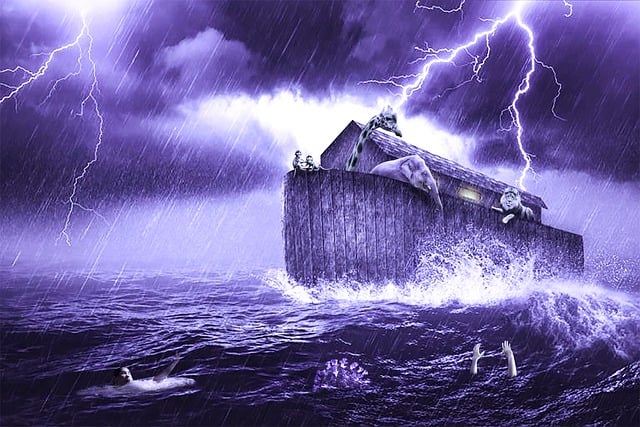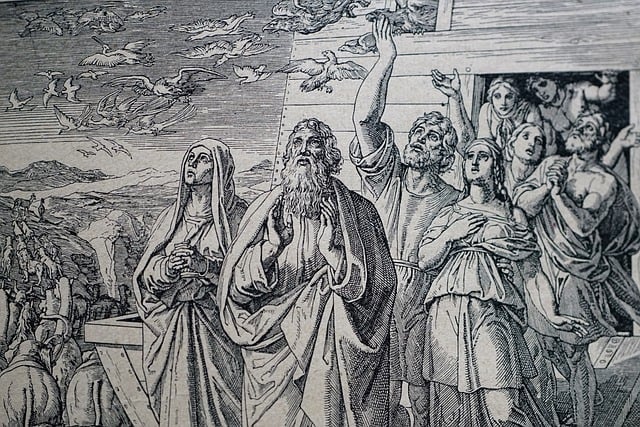For many believers, the idea of God as a divine, beautiful, and merciful Lord crashes as we meet the violent bloodshed and judgments in the Bible. Why did God flood the Earth? How could a perfect and kind God do such things?
The story of Noah and the flood is one that believers and non-believers have grown up hearing. It’s one of the most well-known in the Bible, but also one that’s generally misunderstood. Without good answers, these questions may raise doubt or even keep us up at night. It may make faith seem less believable.
That’s why, in this article, you’ll learn about all the reasons why God would flood the Earth and restore your faith in God.

Why Did God Flood the Earth?
The story of the flood is a larger literary unit from Genesis 1 to 11. However, it starts in Genesis 6:9 with the corruption of mankind.
It’s well-known that it all started with the disobedience of Adam and Eve (Genesis 3). After they tasted the forbidden fruit of knowledge of good and evil, it all went down a spiral for humanity.
Abel was killed by his brother Cain. One of Cain’s descendants, Lamech, became a man of violence and rebellion (Genesis 4). Humanity became an embodiment of evil and sin. It was only a matter of time before God reacted.
Just before the flood, the verses of Genesis 6:5 teach us that God saw men’s wickedness and understood it would only get worse. He was deeply troubled by his own creation, and this grieves him “to his heart”, as stated in Genesis 6:6.
So, he sent floodwaters to stop the wickedness and evil spreading among humanity. Genesis describes the floods as a de-creation of creation. However, God carries Noah’s family and a pair of every animal species on Earth in an ark. This is a fresh new start and a beginning for a different end.
What does the Bible say about why did God flood the Earth
Even if you’ve heard the story countless times, you might still be skeptical. Even though God had been deeply saddened and hurt to have had to destroy his own creation, you might still think he was ruthless.
No matter how you tell the story, our Lord still wipes out all humanity, with the exception of one family. How does this reflect the goodness of our loving God? Why did God flood the Earth?
Below are a few observations of the context from the book of Genesis to help you understand his actions. Let’s explore the reasons why God chose to start over with humanity and flood sin and evil.

God flooded the Earth because of people’s wickedness
The first and most obvious reason God decided to flood the Earth was the increasing wickedness in people’s hearts. The answer to the question can be seen in the verses of Genesis 6:5-7 which tell us how the Lord saw the evil and sin he had created. He then decided he would wipe us from the face of the Earth.
Furthermore, in Genesis 6:11-13 he essentially goes over the same and advises Noah to save a remnant of life for a new beginning.
Humanity had reached a point of no turning back. Even if we think our world today is as wicked as it gets, it was a different story described here. Not only was there evil but there was evil continually. Not one man had a desire for godliness, and no one had even a tiny sense of shame.
To leave our all-mighty God with only one option says everything you need to know for this time. If you compare the verses of Genesis 6:5 with Genesis 1:4, you’ll see how God went from seeing all that is good to witnessing only evil.
God flooded the Earth because he regretted creating mankind
Many puzzling passages raise the question of whether God knew humanity would become so sinful. In several verses, like Genesis 6, our Lord was “sorry” that he had made man on Earth. Later on, in 1 Samuel 15:11 it was reported that God also regretted creating King Saul since he had turned away from God’s will and purpose.
This shows us that God does not feel even the slightest sense of pleasure during the flood. Instead, He feels grief, displeasure, and even sadness because his decision led to sinful and wicked mind states.
God made the Earth a place where mankind would flourish, but humans have made that place into a theatre of violence and disaster, as stated in Genesis 4:8, 4:23, and 6:1-7. God’s heart got broken, so in order to save the human race from sin and evil, he had to flood and destroy his own creation.
Additionally, this would set an example for future generations. It shows God’s serious judgment of sin and sets the stage for Jesus to enter the Earth at the perfect moment for human salvation.
God flooded the Earth because of the corruption
Furthermore, many argue that the angels of God marrying the women on Earth was the cause of the flood. Only something so terrible as angelic interaction with humans would bring God to his last option.
Moreover, with angelic corruption, many rulers believed their existence to be half-god and half-man. These so-called powerful beings would become worshipped by their people.
The entire world had been corrupted by these beliefs, which led God to destroy it with a flood. They no longer worshipped him but the rulers who claimed to be their gods. In the New Testament, Noah is referred to as a righteous man, unlike the rest of humanity.
God flooded the Earth in order to set a picture of the future judgment
The last idea of the reason why God flooded the Earth came from the verses of 2 Peter 2:4-6 and 1 Corinthians 10:1-11. Both passages look at historical events in the Bible where God punished humanity for their sinful acts. Specifically, in 2 Peter, the reference identifies the fallen angels and the flood as what happens to the ungodly and disobedient.
However, it’s vital to remember that God does not act immediately and execute the sinful wrongdoers. He almost always gives chances to people to ask for forgiveness and salvation.
Examples of this are the stories of Lazarus in Luke 16:19-31, Moses, and the Prophets. We also have the examples of Ananias and Sapphira in Acts 5:1-11 where they warn us of the sin of lying to the Holy Spirit. These are all warnings people had during troubling times. However, humanity disobeyed and turned its back on God, leading him to cause the flood.
This tells us that even though our punishment may be delayed, it will certainly come.
The most used Bible verses referencing God’s flood
The story of the flood is recorded in the book of Genesis 6:9 through 9:17. In Genesis 6:17, God states his intentions that he will make all life under the heavens perish with a flood.
However, God’s plan is for Noah and his family to survive this disaster and pursue a Christian life. In Genesis 6:15-21, the Lord commands Noah to build an ark and gives him instructions on how to do so. He is to bring two of all living creatures on Earth to keep them alive with him.
Furthermore, in the verses of Genesis 7:11-24, we learn that the flood kept coming from the heavens for forty days. All creatures that had the breath of life were wiped out from the face of the Earth. The waters flooded for 150 days.
After 150 days, in Genesis 8:1-3, God cleared all the water for Noah and his family. Noah then built an altar dedicated to our all-loving Lord and pleased his will and purpose (Genesis 8:20-22). Then God made a covenant with him that he would never again destroy all living creatures, even if sin corrupts the Earth.

Spiritual Meaning and Symbolism of God Flooding the Earth
God’s decision to flood the Earth holds great symbolism and meaning. Why he used water as a source to destroy all creation may always remain a mystery, but there are numerous assumptions we can make.
On page one of the Bible, in the verses of Genesis 1:6-10, the Earth sinks back into the deep dark waters. The water itself symbolizes wisdom, power, grace, and undifferentiated chaos. Using this element to cleanse and wash the Earth of every unclean mind and spirit is certainly no coincidence.
Why did God specifically use a flood?
God felt great pain when wiping out his own creation off the face of the Earth. Many suggest that God intentionally used water for specific reasons. Although we may never know the true answers, here are a few speculations of why he used this specific element.
God often uses nature to judge
In the Bible, we can find many stories in which God uses nature to punish sinful people. One of the most memorable ones was, of course, the flood. However, he has also caused punishments such as:
- Cursing the ground. In Genesis 4:11-15, we see that as Cain’s punishment for murdering his brother, God cursed the serpents, childbearing, and the ground.
- Turning water into blood. Revelation 16 1 indicates that God ordered his angels to pour their bowls into the water and turn it into blood. This killed all living things inside as punishment for unfaithful disbelievers.
- The infestation of lice. Among the verses of Exodus 8:16-17, Aaron struck the ground, and all the dust became lice. The infestation spread among all of Egypt for their sinful acts.
- Swarms of insects. In Exodus 8:20-32 God commanded the Egyptians to let his people go. However, they were disobedient, which led God to send swarms of insects to them and into their houses.
God used water to cleanse the Earth
Water is often used in order to wash anything from dirt and unclean fragments. That’s precisely what God did. He cleansed the Earth with water. All evil, unclean, sinful, and disobedient people perished to dust.
By doing so, Noah, his family, and the animals could please God’s will and live a righteous life.
God used water as a symbol of a new beginning
After the flood, the newly cleansed Earth was an ideal place for God to create humanity by his will. Noah received new commandments from God that have many similarities to the ones given to Adam and Eve.
Noah was to establish laws or prohibitions of blasphemy, idolatry, adultery, bloodshed, theft, and eating the blood of a living animal. The first time we encounter these commandments are recorded in Genesis 9:4.
Furthermore, like Adam, Noah was to have dominion over the Earth, to be faithful to God, and multiply. However, unfortunately, Noah inherited a world with engraved sinful essence, while Adam was given a perfect, pure world.
Water as punishment
In the flood, we see that water was used as a form of punishment and judgment. However, there are other records where water is used this way. Here are the most renowned events where punishment was executed with this vital element.
You Might Be Interested: Will God Forgive Me For Repeating the Same Sin
The pharaoh and the Israelite boys
In this story, we learn that God was not the only one who used water as a punishment or judgment. Besides our Lord, the pharaoh also used water in a similar manner that God did. He used a body of water to punish all Israelite boys born in Egypt.
Among the verses of Exodus 1:22, we learn that the pharaoh gave a ruthless order to his people. He ordered the execution of all Hebrew boys by throwing them in the river of Nile. However, he let all the girls live.
Even though the river Nile was an instrument for judgment, it’s important to remember that it was also a source of life. Moses was plucked out of the same waters that caused so much grief.
The Red Sea
In the Old Testament, along with the verses of Exodus 14:19-31, we come across one of the most spectacular stories in the Bible. The story plays out as the Israelites are trying to escape from slavery in Egypt. However, on their way, they find themselves trapped between the sea and the Egyptian army.
However, Moses had faith and trust in the Lord to guide them to the Promised Land. When the Egyptians reached the Red Sea, God told Moses to stretch out his hand. With this command, our Lord divided the seas allowing the Israelites a safe passage through the sea.
The Egyptians followed them, but God once again commanded Moses to stretch out his hand. This time, the sea engulfed the army leaving no man alive. This story shows God’s mercy for his followers and wrath for the unbelieving, corrupted men.
Frequently Asked Questions
Why did God choose Noah?
In Genesis 5:29, Noah appears as the son of Lamech and the ninth in the descent of the first man, Adam. Later on, in Genesis 6:11 through 9:19, he is described as a blameless and righteous man that led God to choose him to perpetuate the human race after the flood.
What does the story of Noah and the flood teach us?
The story of Noah and the flood can teach us about judgment and salvation, as well as obedience and disobedience. In a world full of sin and evil, Noah set himself apart and lived a righteous life following God’s will.

 by
by 

